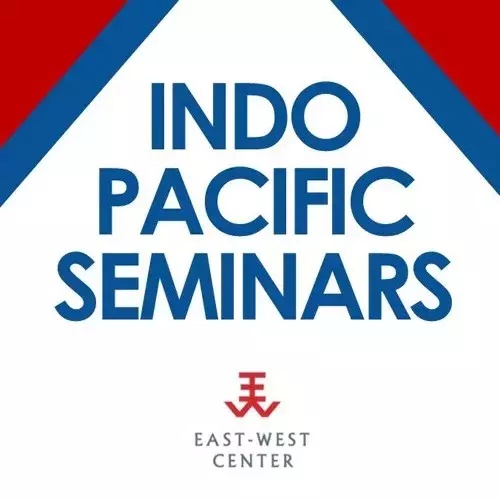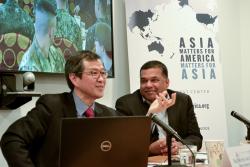Error message

OFFICE/DEPARTMENT
President Moon’s Drive for Change 2020: Rise of Liberal Politics in South Korea
An Indo-Pacific Foreign Policy and Defense Seminar featuring:
Dr. Seong-ho Sheen
Professor of International Security & Director of International Security Center,
Graduate School of International Studies (GSIS),
Seoul National University
Dr. Satu P. Limaye (Moderator)
Vice President, East-West Center &
Director, East West Center in Washington

President Moon Jae-In’s policy agenda has been largely understood as the ‘progressive reform 2.0’ of the late President Roh, his former boss and best friend. And as President Moon’s term has entered the latter half of a five-year presidency, his efforts have achieved significant milestones in both domestic and foreign affairs. These milestones include three summit meetings with Kim Jong-un plus talks of a peace treaty between Seoul and Pyongyang along with Washington, recent passage of key domestic reform bills for national assembly elections, and limiting the power of the prosecutor’s office. Those moves represent certain tectonic shifts in South Korea’s political landscape from 70 years’ dominance of conservative politics to the rise of the progressive liberals in the Korean society. Yet, as President Moon pushes forward his change agenda in 2020, his government faces many challenges including rapidly rising housing prices amid slow economic growth and a widening income gap, stalled nuclear talks between Pyongyang and Washington, political scandals with the indictment of officials close to the President Moon, and strong backlash from conservatives. The April 2020 mid-term general election will be a watershed moment for President Moon’s drive for implementing a liberal agenda which will decide the fate of his reform efforts and South Korea’s political future with important geo-political implications.
For more images, please visit the album for this event on the East-West Center's Flickr page.
SPEAKER BIOGRAPHIES
Seong-ho Sheen is Professor of International Security, and Director of International Security Center at Graduate School of International Studies (GSIS), SNU. He was a visiting fellow at the East-West Center DC, a CNAPS fellow at the Brookings Institution, an assistant research professor at Asia-Pacific Center for Security Studies (APCSS), Honolulu, Hawaii and a research fellow at Institute for Foreign Policy Analysis (IFPA), Cambridge, Mass, the US He has taught at Univ. Mass Boston. In addition, he advised various government organizations including ROK National Ministry of Defense, Ministry of Foreign Affairs, Ministry of Unification, and the ROK National Assembly. His area of interest includes International Security, US Foreign Policy, Northeast Asian Politics and the Korean Peninsula. Professor Sheen received Ph.D. and M.A. from the Fletcher School of Law and Diplomacy, Tufts University and B.A. from Seoul National University.
Satu Limaye is Vice President of the East-West Center and the Director of the East-West Center in Washington where he created and now directs the Asia Matters for America initiative and is the founding editor of the Asia Pacific Bulletin. He is also a Senior Advisor at CNA Corp (Center for Naval Analyses) and Senior Fellow on Asia History and Policy at the Foreign Policy Institute at Paul H. Nitze School of International Studies (SAIS). He is a magna cum laude and Phi Beta Kappa graduate of Georgetown University and received his doctorate from Oxford University (Magdalen College) where he was a George C. Marshall Scholar. Dr. Limaye publishes and presents on a range of Indo-Pacific issues. Recent publications include: Raging Waters: China, India, Bangladesh and Brahmaputra River Politics (with Nilanthi Samaranayake and Joel Wuthnow); Why ASEAN is Here to Stay and What that Means for the US; The United States-Japan Alliance and Southeast Asia: Meeting Regional Demands; and Weighted West: The Indian Navy’s New Maritime Strategy, Capabilities, and Diplomacy.
President Moon’s Drive for Change 2020: Rise of Liberal Politics in South Korea
An Indo-Pacific Foreign Policy and Defense Seminar featuring:
Dr. Seong-ho Sheen
Professor of International Security & Director of International Security Center,
Graduate School of International Studies (GSIS),
Seoul National University
Dr. Satu P. Limaye (Moderator)
Vice President, East-West Center &
Director, East West Center in Washington

President Moon Jae-In’s policy agenda has been largely understood as the ‘progressive reform 2.0’ of the late President Roh, his former boss and best friend. And as President Moon’s term has entered the latter half of a five-year presidency, his efforts have achieved significant milestones in both domestic and foreign affairs. These milestones include three summit meetings with Kim Jong-un plus talks of a peace treaty between Seoul and Pyongyang along with Washington, recent passage of key domestic reform bills for national assembly elections, and limiting the power of the prosecutor’s office. Those moves represent certain tectonic shifts in South Korea’s political landscape from 70 years’ dominance of conservative politics to the rise of the progressive liberals in the Korean society. Yet, as President Moon pushes forward his change agenda in 2020, his government faces many challenges including rapidly rising housing prices amid slow economic growth and a widening income gap, stalled nuclear talks between Pyongyang and Washington, political scandals with the indictment of officials close to the President Moon, and strong backlash from conservatives. The April 2020 mid-term general election will be a watershed moment for President Moon’s drive for implementing a liberal agenda which will decide the fate of his reform efforts and South Korea’s political future with important geo-political implications.
For more images, please visit the album for this event on the East-West Center's Flickr page.
SPEAKER BIOGRAPHIES
Seong-ho Sheen is Professor of International Security, and Director of International Security Center at Graduate School of International Studies (GSIS), SNU. He was a visiting fellow at the East-West Center DC, a CNAPS fellow at the Brookings Institution, an assistant research professor at Asia-Pacific Center for Security Studies (APCSS), Honolulu, Hawaii and a research fellow at Institute for Foreign Policy Analysis (IFPA), Cambridge, Mass, the US He has taught at Univ. Mass Boston. In addition, he advised various government organizations including ROK National Ministry of Defense, Ministry of Foreign Affairs, Ministry of Unification, and the ROK National Assembly. His area of interest includes International Security, US Foreign Policy, Northeast Asian Politics and the Korean Peninsula. Professor Sheen received Ph.D. and M.A. from the Fletcher School of Law and Diplomacy, Tufts University and B.A. from Seoul National University.
Satu Limaye is Vice President of the East-West Center and the Director of the East-West Center in Washington where he created and now directs the Asia Matters for America initiative and is the founding editor of the Asia Pacific Bulletin. He is also a Senior Advisor at CNA Corp (Center for Naval Analyses) and Senior Fellow on Asia History and Policy at the Foreign Policy Institute at Paul H. Nitze School of International Studies (SAIS). He is a magna cum laude and Phi Beta Kappa graduate of Georgetown University and received his doctorate from Oxford University (Magdalen College) where he was a George C. Marshall Scholar. Dr. Limaye publishes and presents on a range of Indo-Pacific issues. Recent publications include: Raging Waters: China, India, Bangladesh and Brahmaputra River Politics (with Nilanthi Samaranayake and Joel Wuthnow); Why ASEAN is Here to Stay and What that Means for the US; The United States-Japan Alliance and Southeast Asia: Meeting Regional Demands; and Weighted West: The Indian Navy’s New Maritime Strategy, Capabilities, and Diplomacy.









